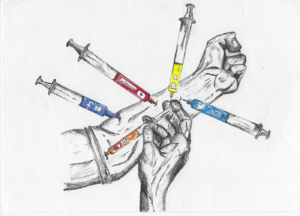Deciding to get treatment for alcohol addiction is an important first step on the road to recovery, but the planning needed to enter rehabilitation requires special care.
If you are just starting on your recovery journey it is important to educate yourself on the best practices for preparing your stay in rehab for alcohol and other drugs. This includes things like how to settle your affairs with family and you employer as well as how to make use of insurance and paid leave, how to pack, and how to emotionally prepare for rehab.
Planning for addiction treatment
Step 1: Talk to Your Family
Rehabilitation programs can last anywhere from 1-3 months and in that time, you will have little to no contact with the outside world. If you have important roles in your household such as being the primary breadwinner or taking care of children or an elderly parent, it’s important to make sure that your loved ones have everything they need both to survive and to keep your keep up any household responsibilities in your absence.
Here are some additional things you may want to think about before leaving for rehab.1
- Assigning someone to pay the bills
- Having your mail picked up or forwarded
- Securing childcare for your children
- Making sure pets will be taken care of
When you feel confident that all your bases are covered at home it will be easier to get into the recovery mindset once you enter treatment.
Step 2: Tell Your Employer
Many understandably have concerns about telling their employer about a substance abuse issue but in most cases, the potential benefits outweigh the risks. If your employer is understanding, they will see your desire for treatment as positive even valuable to the interest of the company.
Telling your employer will also help you to secure vacation time off, sick leave and FMLA (unpaid leave which provides you with 12 weeks of federally protected leave). You will also still retain your medical benefits which will be important for covering the expenses of your stay in a recovery facility as well as any additional aftercare treatment you may need.1,2
Step 3: Packing Your Bags
Rehab centers are secure and isolated facilities. This provides clients with the proper atmosphere to remove themselves from the stressors of daily life to work on their sobriety. Because of this, there are strict rules about what can be brought with you.
For security reasons, there may be items that are absolutely prohibited such as cellphones, laptops or any device that can be connected to the internet as well as clothing that has profane messaging or drug references. Some items like cigarettes, mp3 players or handheld games may be allowed at certain rehab centers but not others.
Just as important as following the guidelines, is packing for the experience. Before going to an unfamiliar place, it is not uncommon to overpack, but you should stick to essentials and make considerations for your environment.
For example, if you are share close quarters with others and you know that there will be on-site laundry facilities you won’t need to pack two or more weeks’ worth of clothes. You also shouldn’t bring clothing that is stiff or uncomfortable.
Instead opt to bring clothing that is cozy attire such as sweaters, sweatpants t-shirts and comfortable footwear. When drug withdrawals kick in, you will be thankful to have them.
It’s also important to note that once you are admitted into rehab, you will have few (if any) opportunities to leave the premises of the recovery center, so it is important to pack smart and come prepared.
Other important items to pack for rehab include the following:3
- Toiletries (deodorant, shaving razors, a toothbrush, hairbrush, toothpaste, hair care products, soap, and shampoo
- Athletic clothes
- Comfortable clothes, socks, and underwear
- Mp3, CD player or a handheld game that can’t connect to the internet
- A journal to write in
- A few good books
- Insurance card and prescription information
Step 4: Be Ready to Make Connections
The friendships you make while in rehab are crucial to maintaining long-term sobriety. These social support networks are comprised of peers who provide understanding, inspiration and are there to helping in your time of need. Building these relationships is an intentional part of your rehab program and without it you will not get the full benefits or residential inpatient care.
Step 5: Immerse yourself in the experience
Depending on your situation, your reservations about attending rehab. Feeling of guilt or skepticism or worries about leaving family behind are a natural part of things but they shouldn’t stop you from making the most of your time in treatment.
For one many quality rehab facilities have amenities like social areas, gyms, basketball nets or tennis courts that you can utilize in your free time. Some alcohol rehab centers offer holistic treatments like art therapy, equine therapy, yoga and meditation and all of them offer some form of counseling to help you learn more about why you use and how you can best put that knowledge to use while in recovery.
Get prepared mentally
Instead of seeing rehab as an experience that is forced upon you, think of it as an opportunity for self-improvement. So seldomly in life do we get the time to work on ourselves free from the distractions and stressors of the outside world–and there is plenty to learn to learn and do while in rehab.
Having a growth mindset in recovery means believing in your ability as a person to change. Just as alcohol addiction is forged by years of bad habits and poor decisions, so too is it possible to unlearn bad habits and win back your self-control and clarity of mind.
Get Help at All American Detox Center
Are you finally ready to quit drugs and alcohol once and for all?
All American Detox is a drug and alcohol treatment and rehab center located in Los Angeles California. Our detox and residential inpatient programs can help you overcome substance abuse in comfort and with confidence. For more information, call us today at (844) 570-1301.
Also Read: How to deal with depression and anxiety
Conclusion
Preparing to stay in rehab for alcohol addiction, far from being simple will test your dedication to getting well. There are many moving parts that will need to be handled with due care and consideration such as coordinating with your employer and insurance, setting aside the time and preparing your family for your inevitable departure.
In the days leading up to enrollment you will also need to pack a bag and mentally prepare yourself for the experiences that wait you in alcohol rehab.
Citations
Before rehab, how to prepare. Help.org. (2022, May 25). Retrieved September 17, 2022, from https://www.help.org/preparing-for-rehab/
Family and medical leave (FMLA). United States Department of Labor. (n.d.). Retrieved September 17, 2022, from https://www.dol.gov/general/topic/benefits-leave/fmla
What to pack for inpatient rehabilitation. UPMC HealthBeat. (2022, April 7). Retrieved September 17, 2022, from https://share.upmc.com/2017/03/packing-for-inpatient-rehab/






